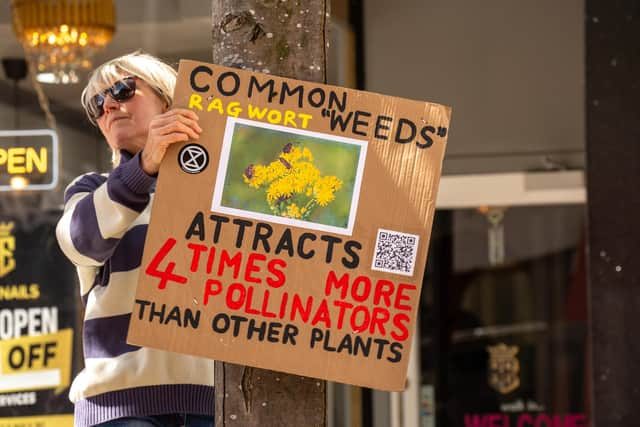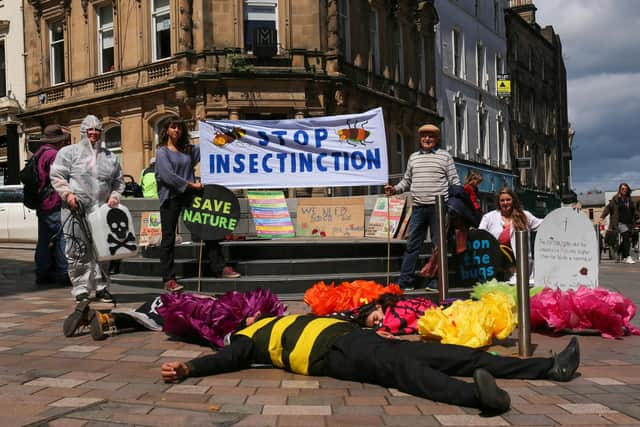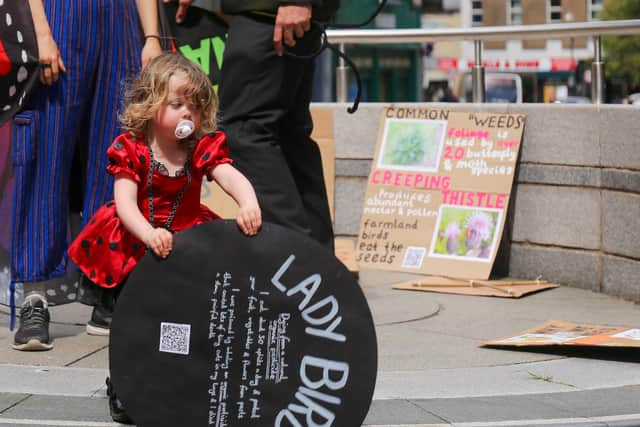Extinction Rebellion activists create a buzz at ‘Insectinction’ demo in Scottish city
Activists from the pressure group Extinction Rebellion were dressed up as different types of insects, surrounded by giant multi-coloured flowers, during the protest in the city.
Placards and banners warned of ‘Insectinction’ and highlighted the importance of bugs to all life on earth.
Advertisement
Hide AdAdvertisement
Hide AdThe demo comes ahead of National Insect Week, which begins on Monday.
A recent survey of flying insects in the UK found numbers have dropped nearly 60 per cent since 2004.
Bees, wasps, butterflies, moths, midges and a host of other insects are vanishing in dramatic numbers, with a variety of causes – including climate change, habitat loss, toxic pesticides and artificial lighting – blamed for declines.
Councils around the UK spend millions of pounds on herbicides to eradicate weeds from public areas.


Glyphosate is the world’s most widely used herbicide, but studies suggest it could be harmful to people, animals – including bees – and the environment.
The World Health Organisation’s International Agency for Research on Cancer classified the chemical as “probably carcinogenic to humans” in 2015.
Despite the warnings, glyphosate-based products are widely available in DIY stores, garden centres and supermarkets and are routinely sprayed on gardens, parks and roadside verges across the country.
Extinction Rebellion Stirling members believe the practice is contributing dramatically to species losses across the local area and further afield.


Advertisement
Hide AdAdvertisement
Hide AdNow they are calling on the local authority to take action to safeguard insects, which play a crucial role in pollination of wild plants and a large proportion of food crops.
Some solutions to the crisis have been put forward in the Stirling Pollinator Action Strategy Plan, which will go to a vote at Stirling Council’s Housing and Environment Committee in September.
“It’s vitally important that action is taken now to avert this insect apocalypse,” said Tom Trull, a local organic gardener and campaigner.


He said lessons could be learned from other councils – such as North Lanarkshire and Falkirk, which have already taken steps to help endangered pollinators through a number of initiatives.
Mandy Cairns, a climate and wildlife activist from the Stirling area, said: “When you consider that insects are at the heart of all ecosystems on the planet – from pollinating over 90 per cent of our global food crops, decomposing and recycling plant, animal and faecal matter and acting as a natural biological control of other crop pest insects, whilst also themselves being an essential food source for birds, mammals and amphibians – it’s shocking that we aren’t doing more to help them when their numbers have plummeted so dramatically, especially since our way of life is so dependent on their survival.”
The demonstrators have urged Stirling Council to follow through with action after declaring a climate and ecological emergency in 2019.
Mr Trull added: “We need them to vote through and adopt the Pollinator Strategy Action Plan recommendations to help avert the insect crisis that will impact all our futures,”
“To do otherwise could lead them open to accusations of greenwashing.”
Comments
Want to join the conversation? Please or to comment on this article.
